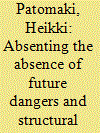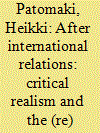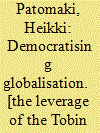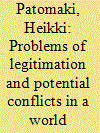|
|
|
Sort Order |
|
|
|
Items / Page
|
|
|
|
|
|
|
| Srl | Item |
| 1 |
ID:
138088


|
|
|
|
|
| Summary/Abstract |
One of the great appeals of securitization theory, and a major reason for its success, has been its usefulness as a tool for empirical research: an analytic framework capable of practical application. However, the development of securitization has raised several criticisms, the most important of which concern the nature of securitization theory. In fact, the appropriate methods, the research puzzles and type of evidence accepted all derive to a great extent from the kind of theory scholars bequeath their faith to. This Forum addresses the following questions: What type of theory (if any) is securitization? How many kinds of theories of securitization do we have? How can the differences between theories of securitization be drawn? What is the status of exceptionalism within securitization theories, and what difference does it make to their understandings of the relationship between security and politics? Finally, if securitization commands that leaders act now before it is too late, what status has temporality therein? Is temporality enabling securitization to absorb risk analysis or does it expose its inherent theoretical limits?
|
|
|
|
|
|
|
|
|
|
|
|
|
|
|
|
| 2 |
ID:
046161


|
|
|
|
|
| Publication |
London, Routledge, 2002.
|
| Description |
xi, 267p.
|
| Standard Number |
0415256607
|
|
|
|
|
|
|
|
|
|
|
|
Copies: C:1/I:0,R:0,Q:0
Circulation
| Accession# | Call# | Current Location | Status | Policy | Location |
| 046639 | 327.101/PAT 046639 | Main | On Shelf | General | |
|
|
|
|
| 3 |
ID:
050085


|
|
|
|
|
| Publication |
London, Zed Books, 2001.
|
| Description |
xxiii, 260p.
|
| Standard Number |
1856498719
|
|
|
|
|
|
|
|
|
|
|
|
Copies: C:1/I:0,R:0,Q:0
Circulation
| Accession# | Call# | Current Location | Status | Policy | Location |
| 047481 | 332.45/PAT 047481 | Main | On Shelf | General | |
|
|
|
|
| 4 |
ID:
113733


|
|
|
|
|
| Publication |
2012.
|
| Summary/Abstract |
There are good security and political economy reasons for furthering integration towards a world political community (WPC), possibly assuming the form of a world state. However, would these reasons provide a legitimate and sustainable basis for the WPC? It is argued in this article that, while the standard security-military and functionalist political economy arguments for world unification may work to a certain point, they are insufficient and may become counterproductive. Especially if perceived in terms of rationally calculative orientation of action, they are not enough and may even work against the WPC. There must also be a belief in normative legitimacy, which may be anchored in universal principles such as popular democracy and human rights. In this light, theories of civilizing process and stages of ethico-political learning are explored. Collective human learning not only explains the quest for democratization but also points towards cosmopolitan ethico-political sentiments. However, there is an internal relationship between democracy and identity, and identities tend to be particular. The case is made, first, for thinking that the otherness of one's narrated 'self' can be located either in the past or, alternatively, in our contemporary being, when seen from a point of view of a possible future position in world history. Second, within a higher level identity-in-difference, a co-constitutive and mutually transformative relation between self and others can involve letting many differences just be.
|
|
|
|
|
|
|
|
|
|
|
|
|
|
|
|
| 5 |
ID:
113728


|
|
|
|
|
| Publication |
2012.
|
| Summary/Abstract |
In some contrast to the traditional and ongoing normative discussions about the desirability of a world state, new and more explicitly geo-historical questions about world political integration are being posed, especially (i) whether elements of world statehood are in existence already, (ii) whether a world state is in some sense inevitable, and (iii) whether, and under what conditions, a world state would be sustainable? For instance, the existing and emerging structures of global governance, of a global public sphere and global constitutionalism can be argued to converge to form at least nascent forms of world statehood. Building on and complementing such diagnoses of existing forms of world statehood, the question arises about whether there are possible and likely, or even inevitable, futures in which the emergence of more 'thick' forms of a world state, understood as a more tightly and substantially integrated expression of political community, could evolve. This possibility raises further questions about the legitimacy, viability and sustainability of such a state form. After a brief overview of these issues, the Introduction provides a preview of the following contributions of this special issue as well as the distinction between the 'global' and the 'world' as one possible future research trajectory in the present context.
|
|
|
|
|
|
|
|
|
|
|
|
|
|
|
|
|
|
|
|
|